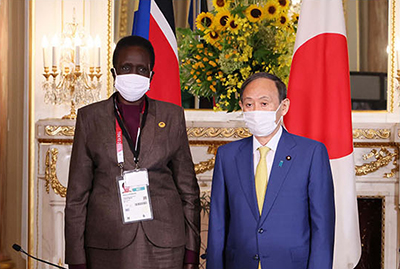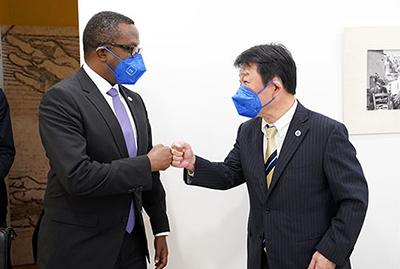Diplomatic Bluebook 2022
Chapter 2
Japan's Foreign Policy by Region
2 East Africa
(1) Uganda
Under President Yoweri Museveni's long-serving administration, Uganda has enjoyed sustained economic growth owing to its stable domestic politics and has contributed to regional stability as a major actor in East Africa. Uganda also actively accepts refugees, including those from South Sudan staying in the northern part of the country. In the presidential election held in January, the incumbent President Museveni won his sixth term.
(2) Ethiopia
Ethiopia hosts the headquarters of the African Union (AU) and occupies an important position in African politics. It has the second largest population in Africa (110 million people) and high annual growth rate of around 10% from 2004 to 2019 (6% in 2020). Addis Ababa, the capital, is one of Africa's leading hubs and is home to the only African airline that operates direct flights to Japan (Ethiopian Airlines).
Armed clashes occurred between the federal government and the Tigray People's Liberation Front (TPLF) in November 2020, and a State of Emergency was declared nationwide in November 2021. The number of internally displaced persons due to this conflict has risen to 9.4 million, and human rights and humanitarian issues are severe. Japan provided humanitarian assistance through international organizations, such as emergency grant aid of 6.6 million US dollars in February and 12.4 million US dollars in December and is working with the international community for the early resolution of the situation.
(3) Eritrea
Eritrea is a country located on the international strait connecting the Indian Ocean, the Suez Canal and Europe. The country has the potential for economic growth thanks to its rich mineral, fishery and tourism resources. Since November 2020, as the situation in northern Ethiopia deteriorates, Eritrea has had an important role in regional stability. In January 2022, Japan opened an embassy in the capital Asmara.
(4) Kenya
As a major power in East Africa, Kenya contributes to the peace and stability of the region and plays a role as a gateway for Japanese companies to expand their markets into Africa. In January, Foreign Minister Motegi visited Kenya to pay a courtesy call to President Uhuru Kenyatta and to meet with Cabinet Secretary for Foreign Affairs Raychelle Awuor Omamo and other officials.
In December, a subcommittee of the 2nd Japan-Africa Public-Private Economic Forum was held online between Nairobi and Japan. Japanese and African businesses and government officials who participated the forum discussed the promotion of business in Africa. At the forum, expectations were expressed for the promotion of activities by private companies in the healthcare field while a memorandum of cooperation on the “Africa Health and Wellbeing Initiative” was introduced, which was signed between Japan and Kenya in December.
(5) Union of Comoros
The Union of Comoros is an island country located in the Indian Ocean and is an Islamic nation endowed with fishery resources. Under President Azali Assoumani, the Union of Comoros has established the “the Emerging Comoros Plan (ECP) for 2030” and is promoting development with tourism, transportation, health, energy and other sectors as priority fields.
(6) Djibouti
Djibouti, located at one of the great trade arteries that passes through the Indian Ocean and connects Europe and Asia, is aiming to be a regional distribution hub. Stability in Djibouti is a key for regional security, and also in achieving a “Free and Open Indo-Pacific.” Since 2011, Djibouti has been hosting the facility of Japan Self-Defense Forces to carry out Japan's counter-piracy operations, and the two countries have developed an excellent relationship.
A presidential election was held in April, and the incumbent President Ismail Omar Guelleh won his 5th term. In May, the first Japan-EU-Djibouti joint exercise on counter-piracy operations was held.
(7) Sudan
Sudan is endowed with crude oil, water resources from the Nile, and fertile land. Civil war has continued for over 40 years since its independence in 1956. In addition, the Bashir administration, which lasted for 30 years, collapsed in 2019 at the outset of demonstrations against rising prices. A provisional government was later established based on an agreement between the armed forces and civilians with the aim of transitioning to civilian rule. The international community supported this initiative: in May 2021, French President Emmanuel Macron hosted a meeting to support this effort. Prior to the Conference, State Minister for Foreign Affairs Washio Eiichiro held an online meeting with Minister of Foreign Affairs Mariam Al-Sadiq Al-Mahdi. However, in October, the armed forces seized power and dissolved the cabinet. Demonstrations by people calling for the transition to civilian rule are continuing. Japan calls for the restoration of transitioning to civilian rule in collaboration with the international community.
(8) Seychelles
Seychelles is an island country in the Indian Ocean and has maintained its stable political situation even through the democratic changes of government in 2020. After COVID-19 swept the country, Seychelles promoted vaccination comparably early in Africa and boasts a high vaccination rate among the population (about 80% of the population has received their second vaccination). The decline in the number of visitors has affected the country, in which tourism is its economic pillar, but it has shown signs of recovery in 2021.
(9) Somalia
In Somalia, a federal government was established in 2012 for the first time in 21 years, but the political situation in the country remains unstable due to challenges such as the humanitarian crisis and continuing terrorist activities by Al-Shabaab. The presidential election was scheduled to take place in February 2021 but as of end 2021, the election was not yet held.
(10) Tanzania
Tanzania, which supports the peace and stability in Southeast Africa, has maintained a high economic growth rate over many years. In recent years, as private sector shows its high willingness to expand into Tanzania, the bilateral relationship with Japan has become closer, especially in terms of the economy and development cooperation. Following the passings of former President John Magufuli in March, President Samia Suluhu Hassan became the first female president in April.
In October, novelist Abdulrazak Gurnah won the Nobel Prize in Literature to become a first Tanzanian laureate of the prize.
(11) Burundi
Burundi's domestic human rights and security situation has continued to deteriorate since the attempted coup d'état by its military in May 2015. President Évariste Ndayishimiye, who took office in June 2020, has promoted a policy of reconciliation with international community, which helped generate momentum for domestic and regional stabilization. Under these circumstances, the United States issued an executive order in November 2021 to lift sanctions on Burundi.
(12) Madagascar
Madagascar is an island country located off the southeastern coast of Africa. On the economic front, investments by Japanese companies in the integrated production of nickel and cobalt, which is the largest mining investment in Africa, are contributing to the economy.
The food crisis caused by the drought is becoming more severe in the southern part of the country, and in February, Japan provided humanitarian assistance such as food aid through emergency grant aid of 3 million US dollars.
(13) South Sudan
South Sudan celebrated its 10th anniversary of independence in 2021 and is preparing for a transition process to a democratic government based on an agreement signed between the parties to the conflict in September 2018. Despite some progress, such as the appointment of governors and the reorganization of the National Legislative Assembly, there are also many issues such as reorganizing the unified force. Japan has been supporting the implementation of the peace process through the Inter-Governmental Authority on Development (IGAD) and other organizations to support the efforts of the South Sudanese government to achieve peace and stability. Vice President Rebecca Nyandeng de Mabior visited Japan in July 2021 to attend the opening ceremony of the Tokyo 2020 Olympic Games and paid a courtesy call to Prime Minister Suga. In addition, South Sudan opened an embassy in Japan in November.
 Courtesy call to Prime Minister Suga by Vice President Rebecca Nyandeng de Mabior of South Sudan
Courtesy call to Prime Minister Suga by Vice President Rebecca Nyandeng de Mabior of South Sudan (July 22. Photo: Cabinet Public Relations Office)
(14) Mauritius
Mauritius is located at the center of the Indian Ocean and is an important country for promoting a “Free and Open Indo-Pacific.” In 2020, following the oil spill of the cargo ship Wakashio, Foreign Minister Motegi provided Prime Minister Pravind Kumar Jugnauth with medium- to long-term support for the restoration and reconstruction of Mauritius. As part of this, in February and August 2021, Japan decided to provide equipment for the purpose of preventing marine accidents.
(15) Rwanda
Rwanda, under the leadership of President Paul Kagame who won his third term in 2017, has continued its efforts on economic development and national reconciliation . In recent years the country has been experiencing rapid growth, especially in the field of Information and Communication Technology (ICT), and the number of Japanese businesses expanding into Rwanda has been also growing.
In June, a foreign ministers' meeting was held between Foreign Minister Motegi and Minister of Foreign Affairs and International Cooperation Vincent Biruta on the occasion of the G20 Foreign and Development Ministers' Meeting. The two ministers also held a telephone call in August, expressing their hopes to further deepen bilateral relations in various fields, including business relations.
 Japan-Rwanda Foreign Ministers' Meeting
Japan-Rwanda Foreign Ministers' Meeting (June 29, Italy, Rome)
